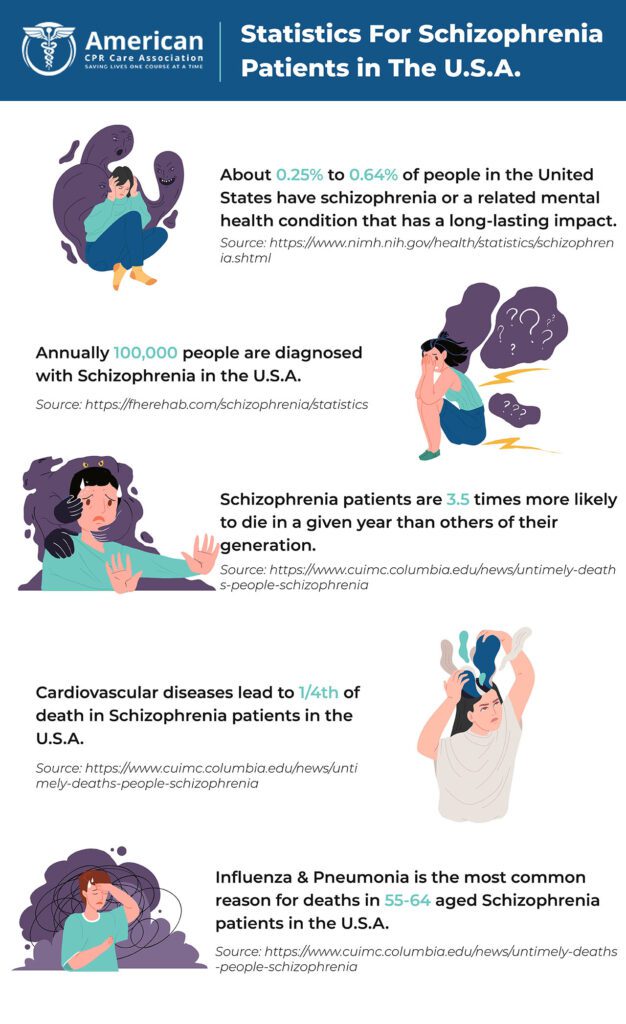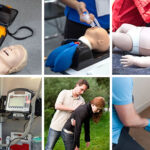Schizophrenia is a severe mental illness in which the sufferer perceives reality strangely. It may include delusions, hallucinations, and severely irrational thinking and behavior. It can make it difficult to carry on daily activities and can render the patient incapacitated. Schizophrenia patients need ongoing care. Early intervention may help keep symptoms under control before major issues arise and may enhance the prognosis in the long run. The exact etiology of schizophrenia is unknown. Experts think that a combination of genetics, brain chemistry, and environment may play a role in the disorder’s emergence. Schizophrenia may be triggered by issues with naturally occurring specific brain chemicals. They are neurotransmitters dopamine and glutamate. Studies on neuroimaging reveal that individuals with schizophrenia have different brain and central nervous system structures. Although scientists are unsure of the importance of these alterations, they do suggest that schizophrenia is a brain disorder.
As per a study, the heart changes in people with schizophrenia may increase their chance of developing heart disease and eventually dying from it. Hence, it’s important for you to stay prepared to deal with cardiac emergencies whenever they arise. You should be able perform CPR on the victim and increase their chances of survival. Take the best Adult, Child and Infant CPR training from American CPR Care Association and learn how to perform CPR with right knowledge and confidence. Our courses are designed by OHSA-trained instructors. You can choose from the online or blended learning programs.
When someone you love has Schizophrenia
To help your loved one to get treatment and recover from schizophrenia, it is crucial to provide your love and support. You can be dealing with a wide range of challenging feelings like guilt, helplessness, fear, shame, rage, and frustration. You can even feel tempted to keep the illness of your loved one hidden from others. Here’s how you can help a person with Schizophrenia:
- Accept the disease and its challenges.
- Not believing that someone suffering from schizophrenia can’t recover or lead a happy, fulfilling life.
- Make every effort to enhance your loved one’s well-being and quality of life.
- Think about your own needs.
- Keep your sense of humor and your optimism.
- You can make wise selections if you know about schizophrenia and its treatment.
- Make your loved one’s atmosphere safe, orderly and encouraging.
- Be patient with your loved one’s healing process. Assist them in setting and achieving manageable goals.
- Encourage as much self-reliance and independence as you can.
Symptoms of Schizophrenia
- Hallucinations
They entail hearing or seeing non-existent objects. Hearing voices is the most frequent hallucination, though they can occur in any sense.
- Delusions
These are erroneous notions that are not supported by reality. For instance, you feel threatened or tormented; you are famous or gifted, or a serious disaster is about to happen.
- Disorganized thoughts (speech)
Chaotic speech implies disorganized thoughts. Answers to questions may be partially or entirely disconnected. This might hinder effective communication.
- Aberrant or wildly disordered motor behavior
It may manifest in a variety of ways. Typical behavior is not goal-focused, and activities are challenging to complete. Resistance to commands, odd or unsuitable postures, a complete lack of response, or unnecessary and excessive movement are all examples of behavior.

Coping with Schizophrenia: Essential Tips and Strategies
Above we discussed Schizophrenia symptoms, and coping tips are shared below:
- Social settings can become unpleasant due to some symptoms. Schizophrenia can make it difficult to process new stimuli since it can affect how they perceive the world.
- Creating a strong support network can be an effective strategy to combat many symptoms of schizophrenia. Accepting help from others can be difficult for those with positive symptoms. For example, psychosis is characterized by hallucinations and delusions.
- Joining support groups for schizophrenia may also be beneficial. People who have the condition come together in support groups. They do it either in-person or online to share their experiences and offer support to one another.
- Therapy is a powerful tool for dealing with emotions and overcoming some sorts of negative thinking. For persons with schizophrenia, cognitive behavioral treatment (CBT) is the most common type of psychotherapy.
How can I communicate with someone experiencing psychosis?
- Keep your sentences concise, direct, and uncomplicated.
- Use a steady tone and a calm voice.
- Give the person some physical room instead of cramming them in.
- Recognize their circumstances and any potential feelings they may be having.
- Do not debate or fight the hallucinations or delusions.
- But do not act as if you believe them.
- Give factual statements noting that their experience is genuine, while remaining impartial but not appeasing.
- Ask them to describe their feelings so you can better comprehend them.
Strategies to calm a Schizophrenic patient in times of panic
- If you’re at home, ask the person having schizophrenia to dunk their face in a bowl or sink full of cold water. It will help calm them as it helps in bringing down their heartbeat when aroused during a panic attack.
- Ask the patient to breathe from their diaphragm. It will trick their brain into believing that they are in a relaxed state.
- Ask the patient to play a game on their mobile phone as it will redirect their thinking.
- Ask them to squeeze a ball or play with slime/play dough. It relieves their stress and helps them focus on the present.
Conclusion
Your love and care can significantly impact the schizophrenic person’s ability to locate the best treatment, manage their symptoms, and create a fulfilling life. You should also train yourself in CPR and first aid to be always prepared to help in a medical emergency. Register with the American CPR Care Association to help your loved ones in a time of need.







